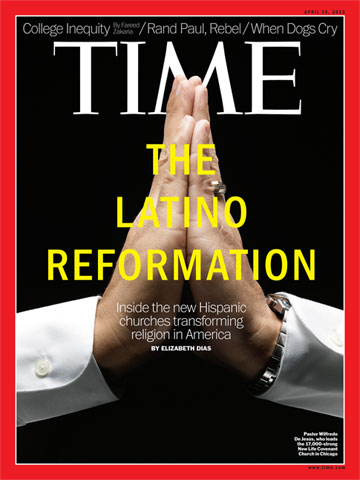
(4 of 7)
Instead of the classic three-point, German-influenced sermons found in many mainline churches, the message at La Roca is theologically raw, unpolished and aimed right at the immigrant experience. Heber Paredes Jr., son of La Roca's pastor, preached one Friday evening about the example of the Apostle Paul's assistant Timothy, who was half Greek and half Jew. Timothy, he preached, had a lot in common with the young Latino men in America today. "When a young man grows up without a father, being half and half, he is mocked. Usually what you see is a troublesome child. Not Timothy ... It is time that we are not just another statistic--it is time we rise up for revival."
But music and sermons alone are not enough to draw people. A hungry person, the saying goes, has no ears. "I don't want to say from the altar on Sunday, 'If someone has a need, let me know,' because I will have a line of people out the door Monday morning, needing money for rent, food. People will take advantage of that," says Paredes Sr. "But we never let people stay in need. We are not going to be able to sleep if we know a family needs food."
Like other evangélico churches, La Roca takes the Bible's "feed the hungry and clothe the naked" mandate literally. At a roundtable conversation one night, a woman wept as she shared how she first met members of a La Roca family when she was a single mother. They were cleaning her office building late one night, and when they learned she did not have an apartment, they decided to move to a two-bedroom unit so she could stay with them. The church is divided into small groups called cells that meet weekly to pray and keep tabs on everyone's needs so they can bring them to the pastor. The church has a rule: on Sunday mornings, you have to greet 10 people before you can hear the sermon.
How Choco Changed Chicago
If one Evangélico church has made the leap from immigrant barrio to booming American megachurch, it is New Life Covenant Church in Chicago. New Life had just 100 members in 2000; all were Spanish speakers. Now more than 17,000 people attend one of the church's four campuses every Sunday, making New Life the largest Assemblies of God church in the U.S. Nine of its 11 weekly services are in English. The pastor, Wilfredo De Jesús, has the support of evangelical giants like Rick Warren, the pastor of Saddleback Church and author of The Purpose Driven Life, who wrote the foreword to De Jesús' book Amazing Faith, published last year.
De Jesús, 48, is tall and broad-shouldered, a straight talker with a firm handshake and a deep voice. He says his nickname, Choco, comes from his love of sweets and the color of his skin. He's of a different genre from the pastors of La Roca and El Calvario. English is his first language. He grew up in Chicago's Humboldt Park neighborhood during its gang-ridden days and then got a master's degree in Christian ministries from North Park Theological Seminary. In terms of the American Dream, he has crossed the great divide.
